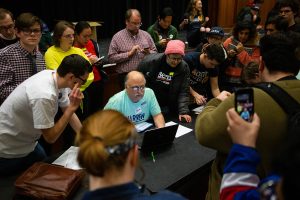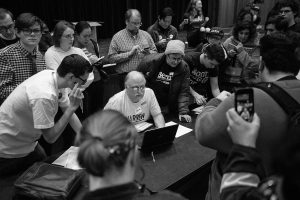Pete Buttigieg and Bernie Sanders lead in partial Iowa caucus results
With 62 percent of Iowa precincts now reporting caucus-night results, Pete Buttigieg and Bernie Sanders lead the Democratic ticket.
Former Mayor of South Bend, Indiana Pete Buttigieg speaks to an audience during a caucus watch party at the Bell Center in Des Moines on Monday, February 3, 2020. At the time of the watch party, no precincts had finalized results. Buttigieg gave a hopeful speech and claimed victory in Iowa.
February 4, 2020
More than 24 hours after the Iowa caucuses, the Iowa Democratic Party released just under three-quarters of Iowa’s precinct results in two waves on Tuesday.
The early tallies show that former South Bend, Indiana Mayor Pete Buttigieg is leading his Democratic contenders with 26.8 percent of state delegate equivalents, followed closely by Sen. Bernie Sanders, I-Vt., — who won the most support in the raw body count during the first and second alignments of the reporting precincts.
The Iowa Democratic Party did not report results on Monday night immediately after the caucuses because of inconsistencies in reporting from caucus sites across the state. The state party released results at 4 p.m. Tuesday with 62.7 percent of Iowa caucus precincts reporting. The state Party released a second wave of results at around 11:30 p.m., inching the share of precincts reporting up to 70.82 percent.
Sanders followed behind Buttigieg with a state delegate equivalency of 25.2 percent and Sen. Elizabeth Warren, D-Mass., came in third with 18.4 percent. Former Vice President Joe Biden placed fourth with 15.4 percent of the state delegate equivalents.
The other 30 percent of precincts that haven’t reported results account for almost a third of Iowa’s precincts, with locations that haven’t reported scattered throughout the state. Three western Iowa counties had 100 percent of precincts reporting, with one eastern Iowa county and two central Iowa counties also reporting 100 percent of its precincts.
To increase transparency in the caucus process, the Iowa Democratic Party released results in three different metrics — a raw total of caucusgoer support, a second reshuffling called the final alignment, and the final state delegate equivalents.
In previous years, the party just released state delegate equivalents, which are calculated based on a formula from the Iowa Democratic Party. Each caucus site reports a certain number of state delegate equivalents. With the party releasing more than one metric measuring how the candidates stacked up on caucus night, more than one campaign can claim a victory.
In an interview with CNN after the first wave of partial results were announced, Buttigieg said the data amounts “to a remarkable victory for our campaign’s vision and message,” while a senior adviser from the Sanders campaign released a statement emphasizing that the partial results indicate that the Vermont senator had more people supporting him at the caucuses than any other Democratic candidate.
With Sanders following Buttigieg closely in his number of delegates, the rankings could change after the rest of the precincts report their results.
Buttigieg gained the most support from Iowans from the first alignment to the second alignment, gaining 3,943 supporters, according to the incomplete results. Sanders gained 1,344, but had more support in the raw body count, with 31,428 Iowans standing in his corner during the first alignment while 27,515 showed up for Buttigieg.
Buttigieg’s support so far comes primarily from rural and suburban counties. The former South Bend, Indiana mayor was able to win more county delegates without having the highest number of Iowans turning out for him on caucus night. The Buttigieg campaign spent a lot of time retail politicking in rural counties in the weeks leading up to the caucuses.
Buttigieg made 162 stops in Iowa since launching his campaign in April 2019. He had several bus tours through rural counties since September, making stops in more rural counties than his opponents who tended to focus on larger towns in western Iowa.
Stella Perlowski, 17, caucused with her mom on Monday night, supporting Biden during the first alignment at Callanan Middle School in Des Moines. After Biden did not reach viability, Perlowski moved to Buttigieg, where her mom was, but said it was an independent decision.
She said Buttigieg supporters pitched the former mayor’s electability, saying Buttigieg has a better chance of beating President Trump in a general election than Sanders.
“[The caucus process] was very enjoyable, I liked it, but it was intense,” Perlowski said. She said there were a lot of Amy Klobuchar supporters who tried to win her support after the first alignment. The Minnesota senator wasn’t viable after the first alignment until several Biden supporters decided to move to her camp, growing the number of Klobuchar supporters to earn two delegates.
Jeremy Dumkrieger, Democratic Party Chair in Woodbury County, said about one-third to half of the people who showed up at his precinct were brand new voters. Sanders won Woodbury County by a wide margin, receiving 1,211 delegate equivalents followed by Biden receiving 871. During the time of the partial results, about 30 of 44 of Woodbury precincts reported results.
“Woodbury has a lot of working-class neighborhoods, you know, a lot of working people and union people, and he won Woodbury [in 2016] too, so it wasn’t a big surprise,” Dumkrieger said.
Iowa pledges 41 delegates to the Democratic National Convention to pick an eventual nominee. The Hawkeye State’s delegates are relatively small compared to California and Texas. They each send 415 and 228 delegates, respectively.






